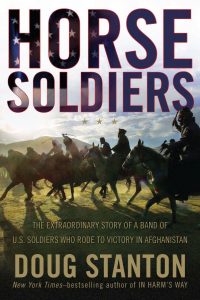Although he is best known for his nonfiction books on war, the first story Doug Stanton ever published was about his proposal to his wife.
The short story ran in Smart magazine in 1990 — the year the two were married.

Despite the difference in word count, the two forms of writing use imagery, scene and voice similarly, Stanton said.
And both are a balancing act.
“I’m trying to use the language to be both evocative and expository at the same time,” he said.
At 3:30 p.m. Thursday, Aug. 23, in the Hall of Philosophy, Stanton will deliver the season’s final Chautauqua Literary and Scientific Circle Roundtable presentation and discuss his book Horse Soldiers: The Extraordinary Story of a Band of U.S. Soldiers Who Rode to Victory in Afghanistan.
Horse Soldiers tells the story of the special forces soldiers who secretly entered Afghanistan immediately following 9/11, a time of “shock to our national sense of ourselves,” Stanton said.
“America had … always felt that its oceans protected it from an attack on its own soil in such a major way,” he said.
And yet, amid this time of disruption, the small band of horse soldiers was ready for action — as bizarre or unexpected as the game plan was.
The true tale was recently spun into a movie, “12 Strong,” starring Chris Hemsworth and Michael Peña. Because of Stanton’s experience — book to screen — he can speak to the Week Nine theme of “Documentary Film as Facilitator: Storytelling, Influence and Civil Discourse,” according to Dave Griffith, vice president and Emily and Richard Smucker Chair for Education.
“I’ve always admired the way that (Stanton) takes untold stories about war and is able to render them in a way that they appeal to a broad audience,” Griffith said. “So his books are not just for people who loves books about war. He really is interested in telling stories about ordinary human beings doing extraordinary things.”
Griffith also said the book, and its cinematic counterpart, engages in the conversation about the role film plays in the national conversation about America’s treatment of veterans, war and the cost of both.
“(The book) really puts you strongly in the perspective of this group of special forces soldiers,” he said. “We see through their eyes, we see the way that we speak; … you feel very much present, there with them.”
Horse Soldiers was Stanton’s second book after In Harm’s Way: The Sinking of the U.S.S. Indianapolis and the Extraordinary Story of Its Survivors, which is also creative nonfiction.
“I thought (In Harm’s Way) was about just ordinary people who happened to be in a wartime environment,” Stanton said, “but really, ultimately, (it) was about people trying to make very difficult decisions under extreme circumstances.”
Stanton said writing that book was a “moving experience” and one that critically informed Horse Soldiers.
“After the book came out, I thought, ‘Well, maybe I could do the same thing about the modern soldier,’” he said. “So it led me to look around for something contemporary.”
That’s when he discovered the incredible story of this small band of horse soldiers. At the time, he had no idea the project would span at least five years and be so difficult to report.
There was also another motivating reason for writing Horse Soldiers. Stanton said 9/11 left him personally with overwhelming questions, such as “How would I explain this to my own kids?” and “What is the appropriate response?”
Horse Soldiers is, in part, an answer.
“In a nutshell, what Horse Soldiers is about is an appropriate response, which, at the time, worked brilliantly,” Stanton said.
The book was also a means for Stanton to make sense out of the chaos that he felt. After meeting the horse soldiers and hearing their strategies and stories of conflict resolution — which rarely fit the portrait of the American soldier Stanton had painted in his mind — he knew it would make for a compelling read.
The book, however, required extensive interviewing to complete.
“What I learned early on in this process of writing Horse Soldiers was that there was really no dumb question,” Stanton said.
For example, in one interview, a soldier used a common acronym. Stanton, unfamiliar with it, asked what it meant.
After being told the definition, two things happened.
“(One, the soldier) realized that I wasn’t trying to pretend to be anything I wasn’t,” Stanton said, “and two, it also allowed them to want to lean in and think to themselves, ‘Wow, if he doesn’t even know that, then how harmful can this guy be?’”
And, Stanton said, his subjects begin to think, “Well, let’s maybe give him a hand.”
“What I learned is you want to come to your subjects and the people you’re meeting with a lot of openness,” he said, “with questions that, for me, are meant to elicit how my subject is more like me, or more like us, than different.”
Stanton said his primary goal in an interview is to reveal a person’s humanity — or inhumanity — and move “outward” from there.
“(And) not focus on the fact that they are trained in certain weapons or know how to fly this kind of airplane, but who are they as people,” he said, “because that’s the story that resonates with us.”
Stanton’s interviewing practice dates back to his days at Esquire, he said, when he frequently wrote celebrity profiles. In covering famous people many readers thought they already knew, Stanton said his mission “was always not what made them famous, but what made them almost banal or mundane.”
“I wanted to catch them in those moments when they were doing the things that we did,” he said, “because for me, the drama in any book or story is the struggle between just that banality of getting through the day and … our public responsibilities, things we have to do to make a living and take care of the people around us.”
This conflict, Stanton said, is shared by all; from movie star to soldier, everyone lives the daily battle of honoring “private dreams” and “public responsibilities.”
And naturally, Stanton carried this struggle over to the film.
While transforming the story onto the page was one undertaking, taking the written words to the big screen was a whole other adventure.
The first surprise for Stanton was how long the process took — nearly a decade.
“(Although) it shouldn’t have, and now I know better,” he said. “But the reality is, making a movie is an enormous investment — creatively and financially.”
The second surprise was in part due to that extensive process: the movie, actually, closely resembles the book.
“‘12 Strong’ is not a movie about people blowing up things and taking prisoners,” Stanton said. “It really was ambitious in that a lot of the movie is about watching the Afghan citizens and the Americans actually try to create a relationship and work together.”
The book, too, is about this working relationship under extreme pressures and high stakes.
Special forces soldiers, according to Stanton, are trained to “find consensus and solve a problem.” This is a tradition that actually came from World War II, he said, in which groups worked together, “often with little means at their disposal, to create social change.”
“And (‘12 Strong’) could’ve easily come off as a movie where things are destroyed and people are taken prisoner,” he said, “but that’s not really what happens, because it follows this brief shining moment when this … small group of guys actually did affect social change in the way that they were trained.”




